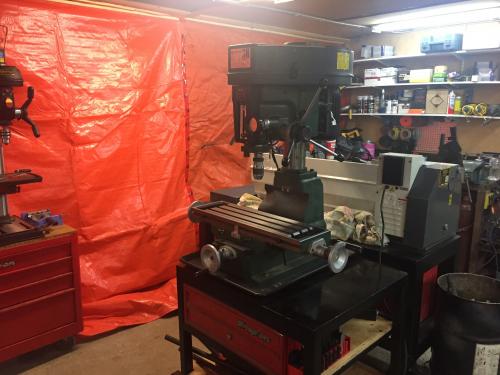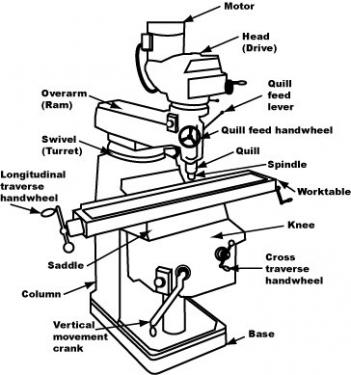Posts: 109
Threads: 24
Joined: Aug 2016
Location: Regina Saskatchewan Canada
I have a Post Style milling machine. I got the unit set up a few weeks ago, but haven't used it yet. Today I decided to install my milling vise. I'm finding it very hard to get the fixed jaw on the vise set true to the quill. I keep getting different readings across the 5.25" vise jaw.
Is there a easy way to tram a Post Style Mill?
Posts: 3,798
Threads: 184
Joined: Jun 2012
Location: Farmington Hills, Michigan
Let's get some terms straight here first; "tramming" normally refers to the process of setting the quill on a mill perpendicular to the table. If you are trying to get the solid jaw on the vise parallel to the X feed on the table, you are "indicating" it. To do that, you need slightly loosen the hold down bolts, sweep an indicator across the solid jaw by moving the table and adjust its alignment before re-tightening the bolts. There is a quick video on my YouTube site that shows a really quick way to do it.
How to Indicate the Vise on a Milling Machine in Just One Pass
Tom
Posts: 109
Threads: 24
Joined: Aug 2016
Location: Regina Saskatchewan Canada
(11-05-2017, 08:40 AM)TomG Wrote: Let's get some terms straight here first; "tramming" normally refers to the process of setting the quill on a mill perpendicular to the table. If you are trying to get the solid jaw on the vise parallel to the X feed on the table, you are "indicating" it. To do that, you need slightly loosen the hold down bolts, sweep an indicator across the solid jaw by moving the table and adjust its alignment before re-tightening the bolts. There is a quick video on my YouTube site that shows a really quick way to do it.
How to Indicate the Vise on a Milling Machine in Just One Pass
Tom
Tom.
Thanks for correcting me on the terms. I wasn't sure if I was right on that or not.
Since the head of mine is on a round post and can swivel from side to side. How do it know it's sitting perfectly centered or at zero degrees to the table? There is no degree indicator or mark on either the head or the post.
Should I indicate the quill to a T Slot in the table before trying to indicate the Vise?
Thanks Trevor
Posts: 109
Threads: 24
Joined: Aug 2016
Location: Regina Saskatchewan Canada
This is my Mill/Drill

I got thinking last night that maybe I should set the head at the height I require it to be on the post.
Then indicate the head to the table and lock it down first. Then try to indicate the Vise.
Am I right in thinking that way? Just worry about one setting at a time!
Posts: 3,798
Threads: 184
Joined: Jun 2012
Location: Farmington Hills, Michigan
The table moves relative to the position of the spindle, so its position doesn't matter. Off hand, I can't think of any reason to accurately set the head perpendicular to the table. I know in the 45 years or so that I've been doing this stuff, I never have.

It would be nearly impossible to do on your machine anyway because there is no over arm to move the head.
Tom
Posts: 109
Threads: 24
Joined: Aug 2016
Location: Regina Saskatchewan Canada
May be a stupid question.
But what is a over arm?
Posts: 8,842
Threads: 318
Joined: Feb 2012
Location: Arizona/Minnesota
(11-05-2017, 09:18 AM)Cross Slide Wrote: May be a stupid question.
But what is a over arm?
Not a stupid question at all.
See the image below. The overarm (ram) allows you to move the head forward and backwards.
Ed

Posts: 109
Threads: 24
Joined: Aug 2016
Location: Regina Saskatchewan Canada
(11-05-2017, 09:45 AM)EdK Wrote: (11-05-2017, 09:18 AM)Cross Slide Wrote: May be a stupid question.
But what is a over arm?
Not a stupid question at all.
See the image below. The overarm (ram) allows you to move the head forward and backwards.
Ed
Thanks Ed.
That definatly clears that question up.
I'm starting to think my test indicator is not accurate.
I have tried Toms method and it's still reading out of alignment.
Posts: 4,438
Threads: 183
Joined: Feb 2012
Location: Missouri, USA
(11-04-2017, 10:09 PM)Cross Slide Wrote: I'm finding it very hard to get the fixed jaw on the vise set true to the quill. I keep getting different readings across the 5.25" vise jaw.
Is there a easy way to tram a Post Style Mill?
All you need to concern yourself with is getting the left side of the vice jaw to read the same as the right side of the vice jaw. If your indicator varies a little bit going across the center portion of the jaw that is not unusual. Vice jaws are not all 100% flat. You just don't want a steady increase or decrease in your reading from one side to the other.
The only time that "swiveling" the head of the mill would be a concern is if you change the height of the head between operations on the same part. For example if you drill a hole in a piece of material, and then find you don't have enough space to insert a reamer to finish the hole. So you raise the head of the mill to install the longer reamer. If the head pivots slightly while raising the head (and you don't notice it) you are no longer in line with the hole you started. If you are lucky and catch it, you would need to re-locate the center of your hole again.
Like Tom sez - it doesn't really matter which way the head is pointing as long as you can reach every point of your material you need to get to.

Willie
Posts: 3,798
Threads: 184
Joined: Jun 2012
Location: Farmington Hills, Michigan
Is your indicator sticking? Try moving it with a finger and make sure it's free throughout its travel.
Tom





![[Image: TomsTechLogo-Profile.png]](http://tomstechniques.com/wp-content/uploads/2013/11/TomsTechLogo-Profile.png)

